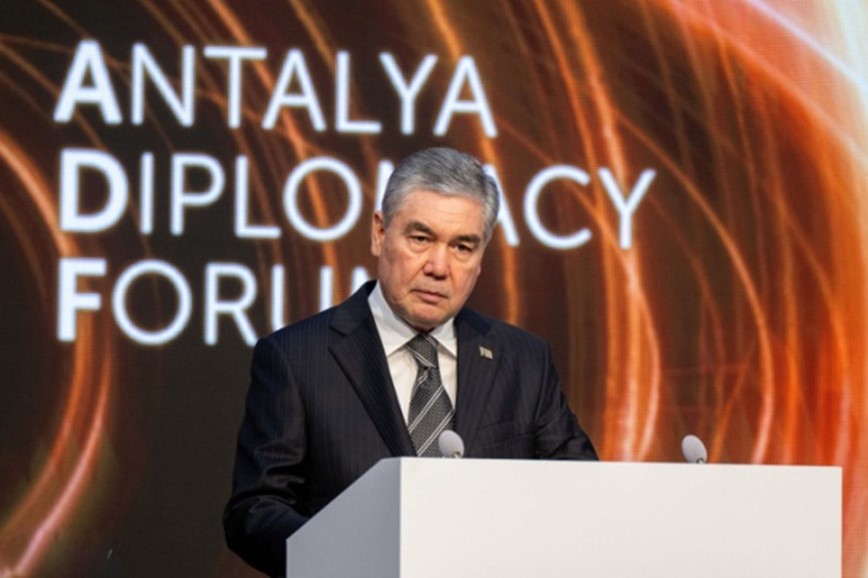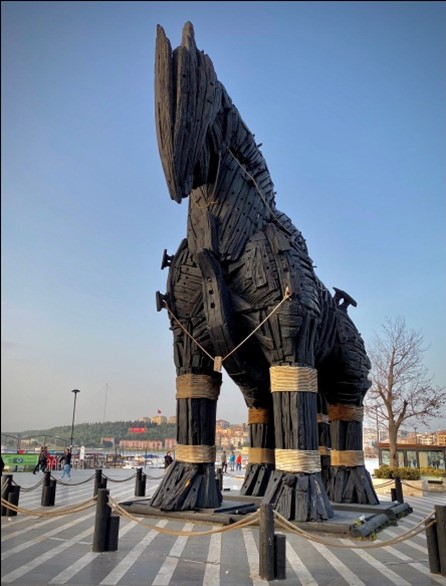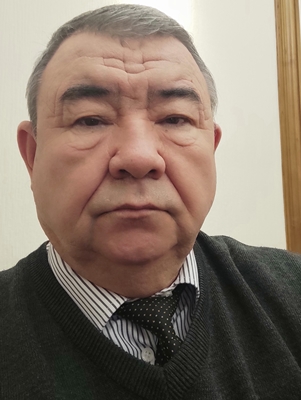Dr. Begench Karaev
“The task and essence of diplomacy is to conduct negotiations, search for common ground, and build strong bridges of interaction. This is exactly what Turkmenistan’s efforts are aimed at.”
From the speech of the National Leader of the Turkmen people, Chairman Khalk Maslakhaty of Turkmenistan Gurbanguly BERDIMUHAMEDOV at the third Antalya Diplomatic Forum ( Antalya, March 1, 2024)
* * *
It is symbolic that Antalya is located at the southern end of the western coast of Turkey, at the other end of which – “at the top” on the map, almost at the junction of the Marmara and Aegean seas, rises the port city of Canakkale . The legendary history of Canakkale is covered with the heroic victory over the foreign aggressors of the Turkish army led by Mustafa Kemal – the future Ataturk – the father of the nation.
The Battle of Canakkale formed the main content of the large-scale Dardanelles operation during the First World War. The largest battle lasted from February 19, 1915 to January 9, 1916 and ended in the complete defeat of the British. Before this final event, Winston Churchill, the initiator and main ideologist of the invasion, being then First Lord of the Admiralty, was literally eager to go into battle. He, apparently, was seized by a passion to seize on the ancient glory of the Achaeans, who set ancient Troy on fire. This mention is not accidental, for Çanakkale is located on the site of the legendary events of the ancient world, described in Homer’s immortal poem “The Iliad”.
As you know, a native of Pomerania, Heinrich Schliemann, who accepted Russian citizenship in his youth, became famous throughout the world for the discovery of Troy a century and a half ago. The so-called “treasure of King Priam,” discovered by Schliemann on May 31, 1873, amounted to about 8,000 objects from the Troy II period. The subsequent discovery in the seventh layer of the Hissarlik hill of the remains of the real Troy described in the Iliad became not only a world sensation, but also created a new version of the appearance of the people on these lands – the founder of Troy called “Tursha”. This name of the ancient people was indicated by the hieroglyphs of the Egyptian stele from the time of Ramses III. It is also believed that the presumptive synonyms of this name are the words “Tyrsenes” and “Tyrrhenians,” which, by the way, are very similar to the current term “Turks”. One confirmation of this is that the famous American archaeologist and anthropologist D. Anthony connects the history of the emergence of Troy with the first wave of settlement of Anatolia by settlers from the geographical East.
Today, the monument to the famous Trojan Horse is a decoration of the port city of Canakkale, located on the site of epic battles described in Homer’s Iliad. As you know, the Trojans actually worshiped this beautiful creation of nature and the child of man, and they also annually held a sacred holiday dedicated to the war horse . It is worth remembering here that the horse is a sacred animal for the Turkmen people, and therefore it is no coincidence that it occupies a central place in the coat of arms of Turkmenistan.
Antalya, unlike Çanakkale, is famous for its magnificent resorts and entertainment and tourist centers near the beautiful waters of the Mediterranean coast with a mild climate, thereby being a unique symbol of natural peace and serenity. Here I would like to say that all humanity today seems to sincerely desire the same peace as in amazing Antalya.
The Third Antalya Forum, in its scale and representative level, today begins to overshadow the global forums traditionally held annually in a number of European centers, the experience of which is measured over decades. About 20 country leaders, 90 ministers, 80 representatives of international organizations, diplomats, representatives of business and academic circles, students – in total more than 4 thousand guests – took part in this largest diplomatic forum, held under the motto “Effective diplomacy for peace and order.”
At the opening of the global forum of world diplomacy, Turkish President Recep Tayyip Erdogan, who celebrated his 70th birthday the day before, on February 26, noted the collapse of the existing international order, but assured that it is still possible to overcome the crisis and achieve peace through diplomacy. “Humanity is going through a truly painful period, filled with crises,” Turkish President Recep said at the opening of the forum. Tayyip Erdogan said, “The 21st century, which we hoped would be a century of prosperity, tranquility, freedom, contrary to all expectations, is gradually turning into an era of crises.”
According to the Turkish leader, the task of this year’s forum is to give diplomacy a chance as a means of resolving international and regional conflicts. At the same time, President Erdogan added: Turkey “does not have the luxury” of observing crises from the sidelines without trying to contribute to de-escalation.
Conceptually new ideas were presented in his speech by the National Leader of the Turkmen people, Chairman Khalk Maslakhaty of Turkmenistan Gurbanguly Berdimuhamedov at the third Antalya Diplomatic Forum, which were aimed at stabilizing the modern world order. The content of the speech clearly outlined the key factors that are determined by the increased potential of the young countries of the world with economies in transition. In this context, the Turkmen Leader also particularly focused on the institution of neutrality using the example of Turkmenistan’s foreign policy activities.
In particular, the National Leader of the Turkmen people emphasized: “The modern world is not like what it was a couple of decades ago. It has become quite complex, multidimensional, and a number of parallel trends have emerged, and one of them is the increasing influence of countries with economies in transition. These countries have great demographic, scientific, production and resource potential, and often a geographically determined opportunity, thanks to which, along with other factors, they are assigned a large role as one of the leaders of the world economy, and providers of political, social and humanitarian development.” The words of the respected Arkadag that “countries with economies in transition must give impetus to a world order that is stable in many respects, but requires restructuring, and introduce new principles and tasks into it” sound particularly relevant, in fact a new vision of the role of subjects of politics and diplomacy in global processes.
Another key idea of the Turkmen Leader is related to the intensification of interstate cooperation in close coordination with international structures, especially the UN and its agencies. This means the formation of a new vector on the “playing field” of world geopolitics, in particular associated with the noticeable activation of relatively young participants in the Community of Nations.
In this regard, the Leader of the Turkmen people drew special attention to the need for the “international organizations, and specialized agencies of the United Nations,” to actively perform the functions of emphasizing the importance of using their potential in performing mediation functions in such areas as organizing direct negotiations with governments, introducing and promoting international affiliate programs . This thesis is also a kind of expression of the firm credo of the Turkmen side regarding support for the fundamental role of the UN as the fundamental institution of the modern system of international relations.
By the way, it must be added that the process of formation of relatively new – in comparison with the UN and other organizations – structures like BRICS, the Organization of Turkic States and others, is complemented by the emergence of effective platforms on an initiative basis. In particular, the Leader of the Turkmen people emphasized in his speech: “Recently, Turkmenistan, adhering to this position, put forward an initiative to create a Group of Friends of Neutrality at the United Nations. Dozens of countries have already joined this idea, which, I am sure, is a well-thought-out decision. The position itself is an awareness of the multi-valued nature of neutrality and the possibilities for building a peaceful and secure future.”
The processes of aggregation of centers for consolidating the efforts of the international community, coordinated with the UN, are also taking place along the geopolitical coordinates “West-East” and “North-South”. Thus, not yet very noticeable changes appear, designed to compensate to a certain extent the entropic consequences of the disorganization of the post-bipolar world and Eurocentric leadership.
As former diplomat and analyst, adviser and speechwriter for the US Senate, now lecturer at Columbia University, Dr. Stuart Gottlieb noted in this regard in his article for the authoritative magazine The National Interest, “Western leaders must do more to address multidimensional threats to the modern world order. First of all, they must begin to see the world through the eyes of others.” This is especially important when the so-called “universal values” stereotypical for Westerners are perceived somewhat differently by representatives of other civilizational traditions, especially in the Middle East and Asian regions. More precisely, the spread of liberal ideas is perceived by them as “the actions of Western countries to promote their own interests.”
“Respect for the views of others may not advance “global liberalism” (at least in the short term), notes Gottlieb , but it can lead to significant peaceful and productive coexistence, including through global institutions of a more modest scale and coverage.”
Against this background, the ideas and proposals put forward by the leaders of Central Asia are no exception. In this regard, the words of respected Arkadag addressed to the participants of the Antalya Forum became a real call to the world community: “The United Nations should be assisted in fulfilling the main mission laid down by its founders – ensuring universal peace, equal cooperation and development. This is not just our moral duty, but is directly related to our responsibility to realistically and objectively assess the risks and threats emerging in the world today.”
Reflections on the results of the Antalya Forum serve as the basis for many speculative and very surreal pictures of the modern world and futuristic hypotheses regarding the further development of events in global geopolitics.
In particular, the modern presentation of the scenario and participants of the Trojan War, as well as the hypothetical disposition of the confrontation between the parties, is very interesting. For example, if Helen was the wife of the Spartan king Menelaus, then where is the supposed Sparta located today? Who or what is “Menelaus”? If the son of King Priam, Paris, who despised traditional family foundations, seduced Helen with liberal habits, then what modern community is prepared for as the fate of Troy?
And if we take into account the capabilities of the naval forces of the beginning of the third millennium, then the Atlantic in its scale may be no more than an ancient gulf. Then, who is threatened by the analogy of fate with the appearance of the “Achaean fleet” at the walls of Troy and where is this supposed Troy located? Are “impenetrable” super-tanks a semblance of the same divine Achilles, but with an “Achilles heel”?
The immortality of epic legends among all peoples of the world lies in the fact that they all remind us of the inviolability of the eternal values of humanity. At the same time, the red line of the narrative makes its way through the inviolable laws of history and the principles of geopolitics. The essence of diplomacy can be expressed by the ancient saying of the Turkmens: “Süleýman bolsaň hem, mura gulak goý!” “(Listen to the ant, even if you are King Solomon!). This means that in the arena of world politics an equally worthy place is given to both small and large, and weak and strong.
This is evidenced by the stories of the death of great rulers and the collapse of empires: the death of the insolent Cyrus at the hands of the queen of the Massagetae Tumaris, the destruction of Rome from the invasion of the Germans, as well as Byzantium from the Turkmens, Khorezm from the Mongols, etc. Finally, it is worth remembering the proud Afghans, unconquered by the great empires, be they Mujahideen or Taliban.
But that is another story.
Dr. Begench Karaev deals with the problems of philosophy of law and politics. He is the author of a number of textbooks and monographs, including “Political analysis and strategic planning”, “Political analysis: problems of theory and methodology: (Experience in the study of modern Central Asian society)” and “Traditional and modern in the political life of Central Asian society (experience of political analysis)”. /// nCa, 10 March 2024


